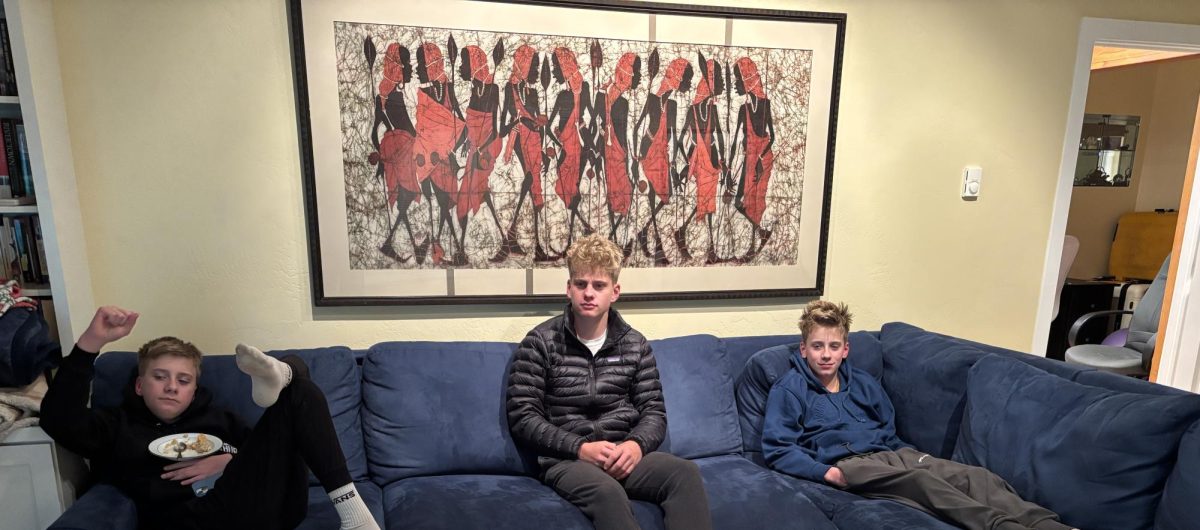The effects of Technology: a good thing or bad thing?
Tigist Peshek sits down to watch the Netflix film “Enola Holmes”
The prevalence of Social media’s negative impact on the world’s younger generations.
Due to the CDC’s push for “social distancing” during COVID-19, interacting with people in-person pre-vaccine was disapproved by many. Paired with the months of encouragement from local, state, and federal governments for lockdown mandates, kids resorted to using their phones to contact each other more frequently than ever before, amplifying a pre-existing issue. The increased screen time spent on online school, Snapchat, Instagram, and other platforms that are commonly used has had an adverse effect on kids, which raises concerns of parents and teachers alike.
SCIENCE Looking at human nature itself, humans have long been social creatures. Making eye contact is one of the most valuable ways people connect when having a conversation, and this is impossible to do over a phone when connecting with someone over social media. Messaging someone rather than speaking to them over the phone has also impaired peoples’ conversational skills.
A publication by Liberty Classical Academy stated that “the tendency to text rather than call people has left the younger generation hopelessly awkward and nervous over the phone”. Not only is this palpable in phone conversations, but in-person conversations as well.
IB Psychology teacher Sarah Ward is a mother of two and is educated on the science behind technology’s effects on human cognitive development, as well as the struggles of being a parent in the age of digital media. She talks about how technology and “happy chemicals” in the brain like serotonin and dopamine are connected.
“As humans we can become addicted to anything. And basically what that means is a neurotransmitter called dopamine is being released into our brain and it’s causing us to need more and more and more of what we’re addicted to,” Ward said. “People are therefore unable to live without it because that reward pathway is being activated every time we look at our phone.”
Phone usage has also reportedly shortened humans’ attention spans substantially. Posted in the same Liberty Classical Academy report, “a recent study by Microsoft Corporation has found the digital lifestyle has made it difficult to stay focused, with the human attention span shortening from twelve seconds to eight seconds in more than a decade.”
Mac Klindworth, a seventh-grader at Aspen Middle School, says she uses her phone two to three hours (and about an hour on social media) daily.
“I feel like [technology usage] is really really bad for your brain, it makes you unfocused and then when you’re at school you’re tempted to check it even when you aren’t allowed to,”
Klindworth said.
BENEFITS
There are benefits to technology, however. Technology was created solely to aid people in day-to-day operations, making life easier in nearly all aspects of life.
An article posted by BBC entitled Technological Influence on Business Activity, discusses upsides and downsides to new technology in the context of business. It lists how technology is more sustainable as it eliminates a great deal of waste, creates more effective communication, allows for the development of innovative approaches, and simplifies manufacturing. Though this is relative to business, it can apply to other areas of life.
“I don’t think we should shut ourselves off from technology because we have to recognize the benefits it provides. It allows us to do things that we weren’t able to do,” Ward said. “I think that’s part of the evolutionary process of humans. We have evolved into a world where technology is important but we also have to be clear with setting boundaries.”
From using a phone to call someone to pick you up, networking, apps that help with self management (ie sleep, anxiety, scheduling, etc), music, entertainment, the list goes on, technology does have a notable beneficial element to it. But at what cost?
ADDICTION AND DETRIMENTS
A publication released in Dialogues in Clinical Neuroscience states that “Potential harmful effects of extensive screen time and technology use include heightened attention-deficit symptoms, impaired emotional and social intelligence, technology addiction, social isolation, impaired brain development, and disrupted sleep.”
“People can even undergo the feelings of withdrawal like they would with any other drug addiction or food addiction or cigarette addiction, so the addictive properties are present with the addiction to the phone that I think a lot of teens are experiencing,” Ward said.
Pearl Soderberg, an AHS senior, deleted the Tik Tok application off her phone after only a few weeks of having it.
“I noticed all of my friends’ time being consumed by Tik Tok even when we were hanging out. No one put down their phones, we were just making and watching Tik Toks and not spending authentic time with each other,” Soderberg said. “I didn’t want to be addicted to that and I wanted to spend time doing something more useful, like going out or going on a run.”
SOCIAL MEDIA
The technological predicament is a known issue. Many have voiced alarm as to how to navigate this new age of digital media.
Countless documentaries and docu-series have been released on streaming platforms like Netflix and Hulu, including “The Social Dilemma” and “The Great Hack” which talk in-depth about the malicious intentions behind big social media companies and the integrity of how they utilize peoples’ personal information.
“Today, when I was walking out of school, I saw this girl that ran into another person because she was staring at her phone,” Klindworth said. “I’d say 50% of the kids in my grade are addicted to their phones. I notice a difference in how they behave.”
As the younger generations download social media apps like Instagram and Tik Tok, they are seeing posts from users within older generations, pushing kids to mimic their behavior in order to fit in. This shortens typical childhood experiences and behavior, causing them to grow up quicker.
“We feel bad for the girls our age that dress and look like sixteen-year-olds. They are missing out on their childhood,” Klindworth said. “They expect everyone to just be the people they see online, when no one is actually like that.”
KIDS AND PARENTS
As technology advances, it is taking up a larger portion of daily life. Kids and teens are exposed to phone and computer usage at a much larger scale, forcing parents to navigate how to regulate and mitigate phone usage for their kids.
“It’s a complex issue as a parent. It’s something that my husband and I talk about all the time. We struggle with what’s the right thing to do,” Ward said.
Since there is no long term research on the effects of social media and technology on humans, it is becoming routine to regulate how much time kids spend on their phones.
“It’s scary when you see [addiction] in a small child, it’s scary when you see it in someone who’s brain isn’t even developed enough to know what addiction is, let alone to manage and regulate themselves,” Ward said.
Ward believes that the most effective way to regulate phone usage is to have important conversations with young ages and lay down rules to put them in the habit of understanding what it means to be responsible with technology. Learning how to utilize technology and social media in a way that would benefit society while mitigating addiction and regulating usage is the first step to succeed in the age of digitalization.
“Without technology, where would we be? Yes, we spend too much time on social media, we’re behind screens too much, but the growth society has experienced is incredible,” Soderberg said. “We’ve learned so much from [technology], there’s a lot of research being done on diseases, for educational purposes, space, it’s helping our world in so many different ways.”
Sarah Ward Interview: Ib Psych teacher
I would say that the biggest problem with phone usage is the addiction that teens face, or just people in general.. So in this case we’re addicted to the gratification that we get from looking at our phones. We’re no longer able to separate ourselves from it. It’s the idea that when a phone was present in your surroundings, people are unable to forget that it exists, With the phone, in order for us to engage in a meaningful way with our peers, it has to be out of sight, we have to remove it from our surroundings. Even if it’s in your pocket, you’re still aware of it. Just like that piece of chocolate, you know it’s there and you still want to have access to it. It’s still distracting you from being in the moment, from having a conversation to going out to dinner.
We have to recognize the benefits, and use them. But we also have to set boundaries for ourselves. I find it upsetting when you go out to dinner and you’d see a family all at dinner all on their phones. You have to ask yourself what has our society become if people are no longer engaging with each other. The pros do outweigh the cons, I think that’s the way that we can minimize those cons. Parents have to set boundaries, those boundaries have to be firm and clear and something that kids can recognize and understand. Educating ourselves on the downside of technology, the dangers of social media, kids self esteem, or just screens and the negative affects that they can have on our brains is essential. We need to use technology as a positive instead of let it be our downfall.
There’s no long term research on these things, we don’t know what the long term effects of screen time is on them. Are they using their time on a screen, are they using the screen for a purpose, or is it simply mindless. I very carefully regulate my kids.
Having those conversations with a really young age is essential. They don’t understand why you’re telling them why they can’t have a screen, they need to understand the reasoning behind it to say “oh I get it”.
Mac Klindworth
“2 or 3 hours, an hour on social media.”
I feel like some of it can be really good but some of it can be really bad. I steal their phones and hide them.
They never talk to anyone.
I say they’re mean, because I feel like technology is wrecking the whole world.
Pearl

Kaelyn Kroeger is a junior at AHS and a Staff Writer for the Skier Scribbler. This is her third year as a journalist and at AHS and recently moved to Aspen...

Jenny Ellis is a Senior at AHS. She is in her third year as a writer for the Skier Scribbler and first year as an EIC. She likes to ski, play soccer, skateboard,...



























